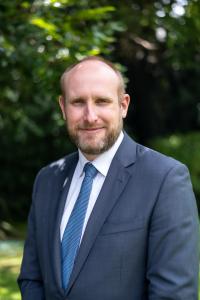Women and Justice - Foundation Office South Africa
f. l. t. r.: Rebecca Sibanda, Christiaan Endres, Prof Amanda Gouws, Sanja Bornman, Karabo Khakhau, Christine Botha
This report was provides by Ms Rebecca Sibanda: Legal Officer, Centre for Constitutional Rights.
The theme of this breakfast was “Women and Justice” with the intention of unpacking the obstacles faced by women in the country when trying to access all forms of justice. On the panel were three women, each well-positioned to speak on the issues - from the political arena, the litigation space, as well as academia.
Professor Amanda Gouws, Professor of Political Sciences at the University of Stellenbosch, specialising in South African Politics, Gender Politics and Political Behaviour, opened the proceedings. She spoke to the importance of identifying the sources of gender inequality, as well as identifying the targets of inequality when having the conversation about what justice means. Different people with different lived experiences require different mechanisms to access effective justice. She also addressed the differences between substantive representation when it comes to women in politics. She asked whether there is a correlation between the women who represent us in Parliament and actual change for women on the ground. She highlighted that for example, the Ministry of Women has no GBV policy in place, despite its mandate and the particular issue of GBV in South Africa.
Professor Gouws was followed by Ms Karabo Khakhau, the youngest member of Provincial Parliament in the country (Free State). She spoke passionately to the unequal treatment that she has experienced by virtue of being a woman, both in her personal life, as well as since she took office in the Legislature. She highlighted issues of ageism and sexism being the most prevalent when attempting to perform her duties, both within the Legislature and her constituency at large. She cited culture as a prominent obstacle to her voice being heard and the issues she tables being considered. She also emphasised the importance of inclusion of all identities in law and policy-making to allow for all womxn to be represented.
Ms Sanja Bornman, the Managing Attorney of the Gender Equity Programme at Lawyers for Human Rights rounded up the discussion. The biggest take-away from her presentation was that in South Africa, women are less likely to have an attorney and women are less likely to have money to pay for legal services - despite being the group that needs it, arguably, the most. Ms Bornman stressed that while South Africa has excellent legislation, navigating the legal system is complicated. The mechanisms in place claim that they make it easy for women to access courts without legal representation, but this is untrue because courts require legal knowledge for effective access. She implored the government to think carefully about how to extend legal representation to women in everyday matters in order to achieve substantive justice.
The theme of this breakfast was “Women and Justice” with the intention of unpacking the obstacles faced by women in the country when trying to access all forms of justice. On the panel were three women, each well-positioned to speak on the issues - from the political arena, the litigation space, as well as academia.
Professor Amanda Gouws, Professor of Political Sciences at the University of Stellenbosch, specialising in South African Politics, Gender Politics and Political Behaviour, opened the proceedings. She spoke to the importance of identifying the sources of gender inequality, as well as identifying the targets of inequality when having the conversation about what justice means. Different people with different lived experiences require different mechanisms to access effective justice. She also addressed the differences between substantive representation when it comes to women in politics. She asked whether there is a correlation between the women who represent us in Parliament and actual change for women on the ground. She highlighted that for example, the Ministry of Women has no GBV policy in place, despite its mandate and the particular issue of GBV in South Africa.
Professor Gouws was followed by Ms Karabo Khakhau, the youngest member of Provincial Parliament in the country (Free State). She spoke passionately to the unequal treatment that she has experienced by virtue of being a woman, both in her personal life, as well as since she took office in the Legislature. She highlighted issues of ageism and sexism being the most prevalent when attempting to perform her duties, both within the Legislature and her constituency at large. She cited culture as a prominent obstacle to her voice being heard and the issues she tables being considered. She also emphasised the importance of inclusion of all identities in law and policy-making to allow for all womxn to be represented.
Ms Sanja Bornman, the Managing Attorney of the Gender Equity Programme at Lawyers for Human Rights rounded up the discussion. The biggest take-away from her presentation was that in South Africa, women are less likely to have an attorney and women are less likely to have money to pay for legal services - despite being the group that needs it, arguably, the most. Ms Bornman stressed that while South Africa has excellent legislation, navigating the legal system is complicated. The mechanisms in place claim that they make it easy for women to access courts without legal representation, but this is untrue because courts require legal knowledge for effective access. She implored the government to think carefully about how to extend legal representation to women in everyday matters in order to achieve substantive justice.











